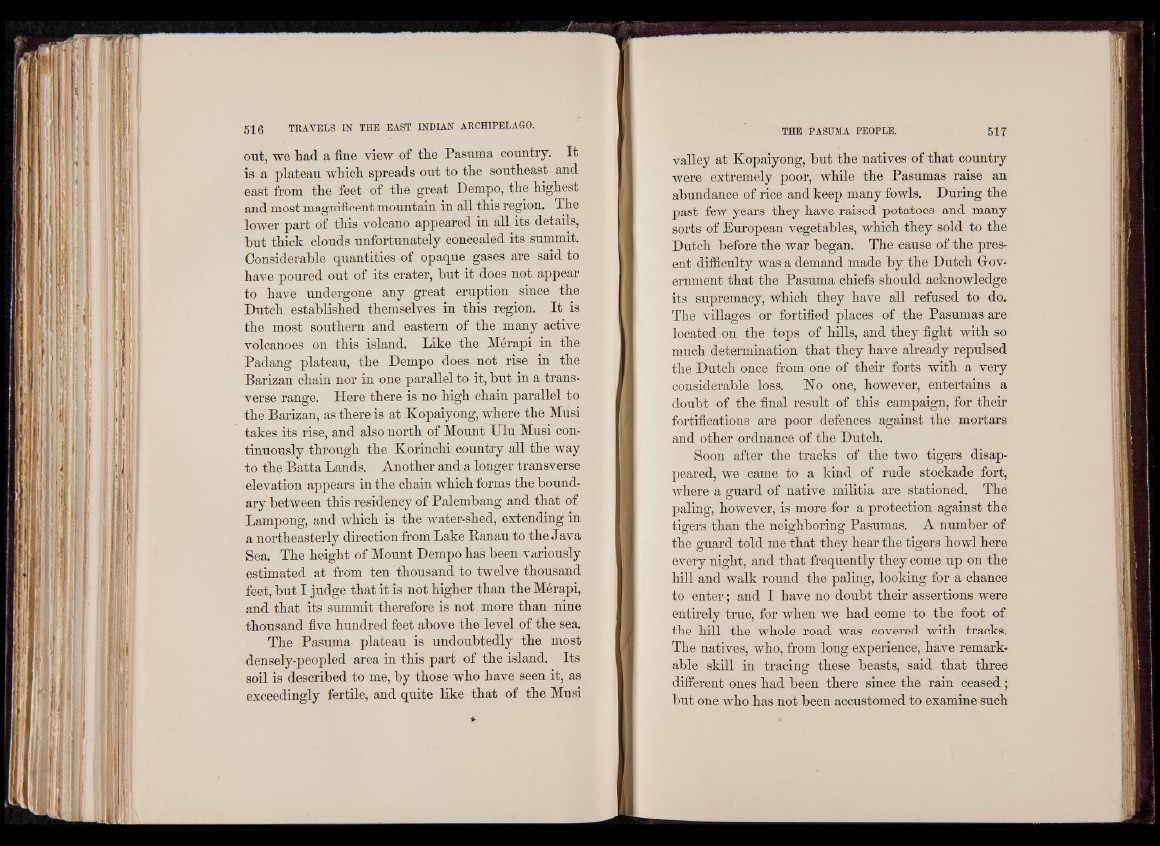
out, we had a fine view of the Pasuma country. It
is a plateau which spreads out to the southeast and
east from the feet of the great Dempo, the highest
and most magnificent mountain in all this region. The
lower part of this volcano appeared in all its details,
but thick clouds unfortunately concealed its summit.
Considerable quantities of opaque gases are said to
have poured out of its crater, but it does not appear
to have undergone any great eruption since the
Dutch established themselves in this region. It is
the most southern and eastern of the many active
volcanoes on this island. Like the Merapi in the
Padang plateau, the Dempo does not rise in the
Barizan chain nor in one parallel to it, but in a transverse
range. Here there is no high chain parallel to
the Barizan, as there is at Kopaiyong, where the Musi
takes its rise, and also north of Mount Ulu Musi continuously
through the Korinchi country all the way
to the Batta Lands. Another and a longer transverse
elevation appears in the chain which forms the boundary
between this residency of Palembang and that of
Lampong, and which is the water-shed, extending in
a northeasterly direction from Lake Kanau to the Java
Sea. The height of Mount Dempo has been variously
estimated at from ten thousand to twelve thousand
feet, but I judge that it is not higher than the Merapi,
and that its summit therefore is not more than nine
thousand five hundred feet above the level of the sea.
The Pasuma plateau is undoubtedly the most
densely-peopled area in this part of the island. Its
soil is described to me, by those who have seen it, as
exceedingly fertile, and quite like that of the Musi
valley at Kopaiyong, but the natives of that country
were extremely poor, while the Pasumas raise an
abundance of rice and keep many fowls. During the
past few years they have raised potatoes and many
sorts of European vegetables, which they sold to the
Dutch before the war began. The cause of the present
difficulty was a demand made by the Dutch Government
that the Pasuma chiefs should acknowledge
its supremacy, which they have all refused to do.
The villages or fortified places of the Pasumas are
located on the tops of hills, and they fight with so
much determination that they have already repulsed
the Dutch once from one of their forts with a very
considerable loss. No one, however, entertains a
doubt of the final result of this campaign, for their
fortifications are poor defences against the mortars
and other ordnance of the Dutch.
Soon after the tracks of the two tigers disappeared,
we came to a kind of rude stockade fort,
where a guard of native militia are stationed. The
paling, however, is more for a protection against the
tigers than the neighboring Pasumas. A number of
the guard told me that they hear the tigers howl here
every night, and that frequently they come up on the
hill and walk round the paling, looking for a chance
to enter; and I have no doubt their assertions were
entirely true, for when we had come to the foot of
the hill the whole road was covered with tracks.
The natives, who, from long experience, have remarkable
skill in tracing these beasts, said that three
different ones had been there since the rain ceased;
but one who has not been accustomed to examine such